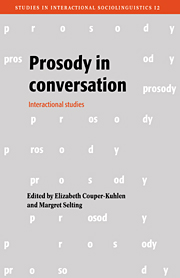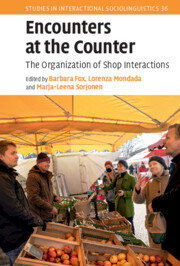Grammar in Everyday Talk
Building Responsive Actions
Part of Studies in Interactional Sociolinguistics
- Authors:
- Sandra A. Thompson, University of California, Santa Barbara
- Barbara A. Fox, University of Colorado Boulder
- Elizabeth Couper-Kuhlen, University of Helsinki
- Date Published: June 2015
- availability: Available
- format: Hardback
- isbn: 9781107031029
Hardback
Other available formats:
eBook
Looking for an inspection copy?
Please email [email protected] to enquire about an inspection copy of this book
-
Drawing on everyday telephone and video interactions, this book surveys how English speakers use grammar to formulate responses in ordinary conversation. The authors show that speakers build their responses in a variety of ways: the responses can be longer or shorter, repetitive or not, and can be uttered with different intonational 'melodies'. Focusing on four sequence types: responses to questions ('What time are we leaving?' - 'Seven'), responses to informings ('The May Company are sure having a big sale' - 'Are they?'), responses to assessments ('Track walking is so boring. Even with headphones' - 'It is'), and responses to requests ('Please don't tell Adeline' - 'Oh no I won't say anything'), they argue that an interactional approach holds the key to explaining why some types of utterances in English conversation seem to have something 'missing' and others seem overly wordy.
Read more- Based on a rich collection of empirical data, such as telephone and video communication from everyday interactions
- Demonstrates that grammatical patterns and regularities can be best understood by reference to the interactional contexts in which they occur
- Argues that the precise formulation chosen by respondents depends on the subtle interactional work they hope to accomplish with their utterance
Reviews & endorsements
'[This book] challenges serious scholars of language and social interaction with a rich, new and exquisitely contextual account of the work people do through their responses in real-time social interaction. Findings presented in the book are fully data-driven and compel us to critically re-envision the traditionally taken-for-granted notions that some utterances are 'elliptical' or 'non-sentential'. [The authors] demonstrate that response formats are artfully and precisely fitted to their contexts, and that the attested composition of utterances results from the limited range of meaning-making potentials opened up in the course of developing sequences of action. The presentation of findings, representing a new standard of methodological and theoretical integrity, is tightly articulated with forty years of research on language form and interactional sequence. Future research on sequence organization and action formats must take this book as a fundamental reference point, including the cross-linguistic expansion of this project, which the authors enthusiastically invite.' Cecilia E. Ford, University of Wisconsin, Madison
See more reviews'This brilliant book brings important new points of emphasis to the study of language and social action. Its groundbreaking analyses of human agency in responding are a very welcome contribution.' N. J. Enfield, University of Sydney
'Based on naturally occurring video and telephone conversations, Grammar in Everyday Talk explores the morphosyntactic and prosodic design of responsive actions. It also uncovers the sequential contexts in which minimal and expanded responses are routinely found, and in which sequential and interactional circumstances speakers might be motivated to choose one rather than the other. It is a pioneering work which focuses on the interaction between prosody and syntax in the way English speakers build response.' Zhou Xiao-jun, Zhejiang University
'All in all, this study provides a new 'paradigm' that is quite different from the one taken up in most previous studies about grammar, in which a paradigm is static, abstract, and exists outside of any context of use. … This book is highly recommended for scholars working in the field of syntax, discourse analysis, social linguistics and pragmatics.' Zhou Xiao-jun, Journal of Language and Politics
Customer reviews
Not yet reviewed
Be the first to review
Review was not posted due to profanity
×Product details
- Date Published: June 2015
- format: Hardback
- isbn: 9781107031029
- length: 356 pages
- dimensions: 237 x 158 x 25 mm
- weight: 0.66kg
- contains: 40 b/w illus. 45 tables
- availability: Available
Table of Contents
1. Introduction
2. Responses in information-seeking sequences with 'question-word interrogatives'
3. Responses in informing sequences
4. Sequences with assessment responses
5. Responses in request-for-action sequences
6. Conclusions.-
General Resources
Find resources associated with this title
Type Name Unlocked * Format Size Showing of
This title is supported by one or more locked resources. Access to locked resources is granted exclusively by Cambridge University Press to lecturers whose faculty status has been verified. To gain access to locked resources, lecturers should sign in to or register for a Cambridge user account.
Please use locked resources responsibly and exercise your professional discretion when choosing how you share these materials with your students. Other lecturers may wish to use locked resources for assessment purposes and their usefulness is undermined when the source files (for example, solution manuals or test banks) are shared online or via social networks.
Supplementary resources are subject to copyright. Lecturers are permitted to view, print or download these resources for use in their teaching, but may not change them or use them for commercial gain.
If you are having problems accessing these resources please contact [email protected].
Sorry, this resource is locked
Please register or sign in to request access. If you are having problems accessing these resources please email [email protected]
Register Sign in» Proceed
You are now leaving the Cambridge University Press website. Your eBook purchase and download will be completed by our partner www.ebooks.com. Please see the permission section of the www.ebooks.com catalogue page for details of the print & copy limits on our eBooks.
Continue ×Are you sure you want to delete your account?
This cannot be undone.
Thank you for your feedback which will help us improve our service.
If you requested a response, we will make sure to get back to you shortly.
×







